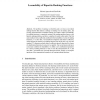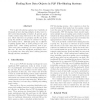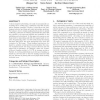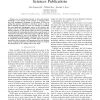CIKM
2000
Springer
15 years 4 months ago
2000
Springer
RankBoost is a recently proposed algorithm for learning ranking functions. It is simple to implement and has strong justifications from computational learning theory. We describe...
109
Voted
VLDB
2004
ACM
15 years 5 months ago
2004
ACM
We investigate the problem of ranking answers to a database query when many tuples are returned. We adapt and apply principles of probabilistic models from Information Retrieval f...
97
Voted
COLT
2005
Springer
15 years 5 months ago
2005
Springer
The problem of ranking, in which the goal is to learn a real-valued ranking function that induces a ranking or ordering over an instance space, has recently gained attention in mac...
P2P
2005
IEEE
15 years 6 months ago
2005
IEEE
Peer-to-peer file-sharing systems have hundreds of thousands of users sharing petabytes of data, however, their search functionality is limited. In general, query results contain...
87
Voted
SIGIR
2006
ACM
15 years 6 months ago
2006
ACM
Content-targeted advertising, the task of automatically associating ads to a Web page, constitutes a key Web monetization strategy nowadays. Further, it introduces new challenging...
107
click to vote
CIKM
2007
Springer
15 years 6 months ago
2007
Springer
Modern web search engines are expected to return top-k results efficiently given a query. Although many dynamic index pruning strategies have been proposed for efficient top-k com...
109
click to vote
ICDE
2008
IEEE
15 years 6 months ago
2008
IEEE
— Learning to rank has become a popular method for web search ranking. Traditionally, expert-judged examples are the major training resource for machine learned web ranking, whic...
104
click to vote
TACAS
2010
Springer
15 years 7 months ago
2010
Springer
Ranking function synthesis is a key aspect to the success of modern termination provers for imperative programs. While it is wellknown how to generate linear ranking functions for ...
109
Voted
WSDM
2010
ACM
15 years 9 months ago
2010
ACM
Queries describe the users' search intent and therefore they play an essential role in the context of ranking for information retrieval and Web search. However, most of exist...
112
Voted
ICDE
2010
IEEE
16 years 3 days ago
2010
IEEE
An ever-increasing amount of data and semantic knowledge in the domain of life sciences is bringing about new data management challenges. In this paper we focus on adding the seman...




